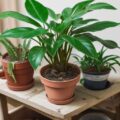Having houseplants can greatly enhance the beauty and air quality of your home. However, if you have pets, it’s crucial to ensure that your plants are safe for them. Many common houseplants can be toxic to cats and dogs if ingested. In this article, we’ll explore a variety of pet-safe houseplants that you can enjoy without worrying about your furry friends.
Why Choose Pet-Safe House Plants?
The safety of your pets should always come first. Some plants contain toxins that can cause serious health issues in animals, ranging from mild stomach upset to severe poisoning and even death. By choosing pet-safe houseplants, you can create a safe and healthy environment for your pets while still enjoying the benefits of indoor greenery.
Top Pet-Safe House Plants
1. Spider Plant (Chlorophytum comosum)
The spider plant is a popular choice for pet owners. It’s non-toxic to both cats and dogs and is also very easy to care for. Spider plants thrive in indirect sunlight and can tolerate a variety of indoor conditions.
2. Boston Fern (Nephrolepis exaltata)
Boston ferns are another excellent option for pet-friendly households. These lush, green ferns are safe for pets and can add a touch of elegance to any room. They prefer high humidity and indirect light, making them perfect for bathrooms or kitchens.
3. Areca Palm (Dypsis lutescens)
The areca palm, also known as the butterfly palm, is a pet-safe plant that can grow quite large, making it a great statement piece. It enjoys bright, indirect light and regular watering.
4. Calathea (Calathea spp.)
Calatheas are known for their striking foliage and are safe for pets. They prefer low to medium light and high humidity, making them a bit more challenging to care for but well worth the effort.
5. African Violet (Saintpaulia)
African violets are small, pet-safe flowering plants that can add a pop of color to your home. They thrive in moderate to bright, indirect light and need consistent moisture to flourish.
How to Care for Pet-Safe House Plants
While choosing pet-safe plants is important, proper care is also crucial to ensure they thrive. Here are some general tips for caring for your pet-safe houseplants:
- Light: Most pet-safe plants prefer indirect sunlight. Be sure to research the specific light requirements for each plant.
- Water: Over-watering is a common issue. Allow the soil to dry out slightly between waterings, and use pots with drainage holes to prevent root rot.
- Humidity: Some pet-safe plants require higher humidity levels. Consider using a humidifier or placing a tray of water near your plants to increase humidity.
- Soil: Use well-draining soil to promote healthy root growth. You can also add perlite or sand to improve drainage.
Creating a Pet-Safe Indoor Garden
Creating a pet-safe indoor garden involves more than just choosing the right plants. Here are a few additional tips to ensure your garden is safe and enjoyable for your pets:
- Placement: Place plants out of reach of curious pets, especially if they tend to chew on things.
- Training: Train your pets to avoid chewing on plants. Use deterrent sprays if necessary.
- Observation: Regularly check your plants for any signs of damage or pests that could harm your pets.
- Non-toxic plant choices: Stick to plants that are confirmed to be non-toxic by reputable sources such as the ASPCA.
FAQ
1. What are some signs that my pet has ingested a toxic plant?
Symptoms can vary depending on the plant but often include vomiting, diarrhea, drooling, and lethargy. If you suspect your pet has ingested a toxic plant, contact your veterinarian immediately.
2. Can pet-safe plants still cause any issues for pets?
While pet-safe plants are non-toxic, they can still cause mild stomach upset if ingested in large quantities. It’s best to keep plants out of reach to prevent any issues.
3. How can I keep my pets from chewing on my houseplants?
Try placing plants out of reach, using deterrent sprays, or providing your pets with safe chew toys to distract them.
4. Are there any other benefits to having houseplants besides safety for pets?
Yes, houseplants can improve air quality, reduce stress, and enhance the aesthetic appeal of your home. They can also contribute to a sense of well-being and relaxation.
5. Where can I find a list of pet-safe houseplants?
Reputable sources such as the ASPCA provide comprehensive lists of pet-safe houseplants. You can also consult with your local nursery or garden center for recommendations.









